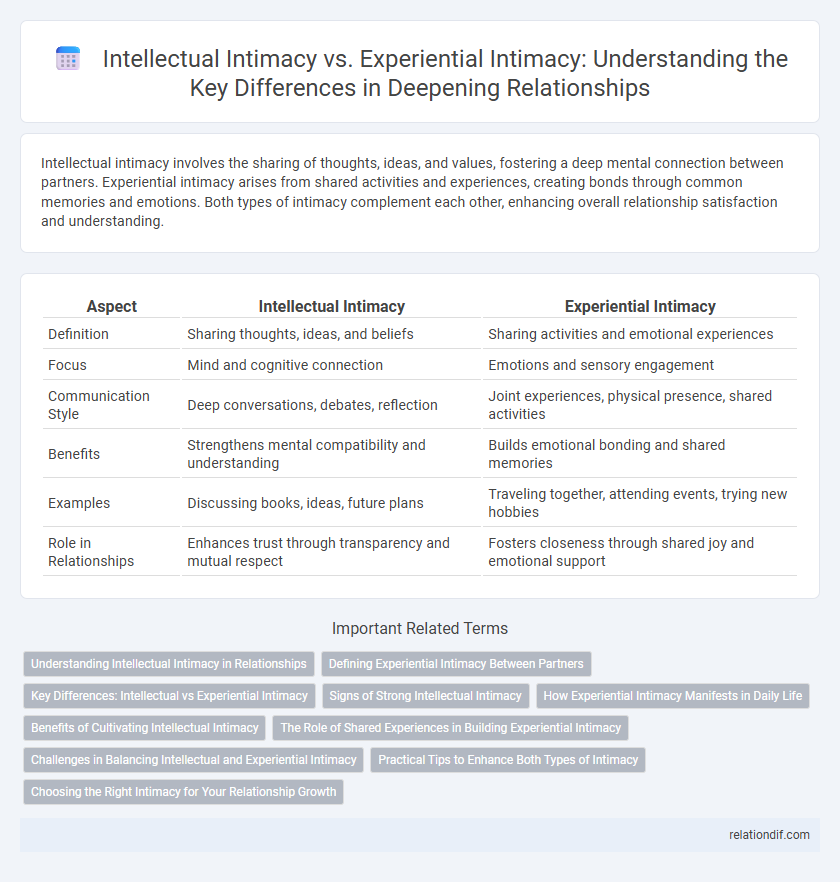Intellectual intimacy involves the sharing of thoughts, ideas, and values, fostering a deep mental connection between partners. Experiential intimacy arises from shared activities and experiences, creating bonds through common memories and emotions. Both types of intimacy complement each other, enhancing overall relationship satisfaction and understanding.
Table of Comparison
| Aspect | Intellectual Intimacy | Experiential Intimacy |
|---|---|---|
| Definition | Sharing thoughts, ideas, and beliefs | Sharing activities and emotional experiences |
| Focus | Mind and cognitive connection | Emotions and sensory engagement |
| Communication Style | Deep conversations, debates, reflection | Joint experiences, physical presence, shared activities |
| Benefits | Strengthens mental compatibility and understanding | Builds emotional bonding and shared memories |
| Examples | Discussing books, ideas, future plans | Traveling together, attending events, trying new hobbies |
| Role in Relationships | Enhances trust through transparency and mutual respect | Fosters closeness through shared joy and emotional support |
Understanding Intellectual Intimacy in Relationships
Intellectual intimacy in relationships involves sharing thoughts, ideas, and engaging in deep conversations that foster mutual understanding and respect. This form of connection enhances emotional bonds by encouraging open-mindedness and cognitive compatibility between partners. Experiential intimacy, while centered on shared activities and memories, complements intellectual intimacy by grounding the relationship in both mental and physical experiences.
Defining Experiential Intimacy Between Partners
Experiential intimacy between partners is defined by shared activities and moments that foster emotional closeness through direct experience, such as traveling together or engaging in hobbies. Unlike intellectual intimacy, which centers on exchanging ideas and thoughts, experiential intimacy strengthens bonds by co-creating memories and sensations. This form of connection deepens understanding and trust by emphasizing presence and mutual engagement in the physical and emotional realms.
Key Differences: Intellectual vs Experiential Intimacy
Intellectual intimacy centers on sharing thoughts, ideas, and stimulating conversations that deepen mental connection and mutual understanding between partners. Experiential intimacy involves engaging in shared activities and creating memories together, fostering emotional bonding through common experiences. The key difference lies in intellectual intimacy prioritizing cognitive closeness, while experiential intimacy emphasizes emotional resonance through joint participation.
Signs of Strong Intellectual Intimacy
Signs of strong intellectual intimacy include engaging in deep, meaningful conversations where both partners feel heard and understood, sharing new ideas and perspectives without fear of judgment, and consistently stimulating each other's curiosity and critical thinking. This form of intimacy fosters a sense of mutual respect and mental connection, often reflected in collaborative problem-solving and a shared enthusiasm for learning. Intellectual intimacy strengthens the bond by creating a dynamic exchange of thoughts that enhances emotional closeness.
How Experiential Intimacy Manifests in Daily Life
Experiential intimacy manifests in daily life through shared activities and physical presence, such as cooking together, exercising, or simply spending quiet moments side by side. This form of intimacy deepens connection by creating joint memories and fostering non-verbal communication, which strengthens emotional bonds. Unlike intellectual intimacy that relies on exchanging thoughts and ideas, experiential intimacy builds closeness through tangible, lived experiences that engage the senses and emotions.
Benefits of Cultivating Intellectual Intimacy
Cultivating intellectual intimacy enhances communication by fostering deep conversations that strengthen mutual understanding and trust between partners. This form of intimacy stimulates mental connection, encouraging growth, curiosity, and shared learning experiences that enrich the relationship. Intellectual intimacy also provides a foundation for emotional support and resilience, enabling couples to navigate challenges with empathy and collaborative problem-solving.
The Role of Shared Experiences in Building Experiential Intimacy
Shared experiences play a crucial role in building experiential intimacy by creating a common emotional landscape that fosters deeper connections. Engaging in activities together stimulates mutual understanding and trust beyond verbal communication, enhancing the bond between individuals. This form of intimacy relies on collective memories and emotional responses, which strengthen relational ties more powerfully than intellectual exchanges alone.
Challenges in Balancing Intellectual and Experiential Intimacy
Balancing intellectual intimacy, which centers on deep conversations and shared ideas, with experiential intimacy, grounded in shared activities and physical closeness, presents unique challenges in relationships. Partners may struggle to align their preferences when one values cognitive connection while the other prioritizes sensory experiences, causing potential misunderstandings or emotional distance. Effective communication and mutual respect are essential to harmonize these dimensions, ensuring a well-rounded and fulfilling intimate bond.
Practical Tips to Enhance Both Types of Intimacy
Cultivating intellectual intimacy involves engaging in meaningful conversations, sharing thoughts openly, and showing genuine curiosity about your partner's ideas and beliefs. Experiential intimacy can be strengthened through shared activities such as cooking, traveling, or practicing hobbies together, fostering a sense of bonding through mutual experiences. Prioritizing both types of intimacy by balancing deep dialogue with collaborative experiences enhances emotional connection and relationship satisfaction.
Choosing the Right Intimacy for Your Relationship Growth
Intellectual intimacy involves sharing thoughts, ideas, and values, fostering connection through meaningful conversations and mutual understanding. Experiential intimacy centers on shared activities and experiences that build trust and emotional bonds through living moments together. Choosing the right intimacy depends on your relationship goals, balancing cognitive connection with shared experiences to promote deeper growth and fulfillment.
intellectual intimacy vs experiential intimacy Infographic

 relationdif.com
relationdif.com